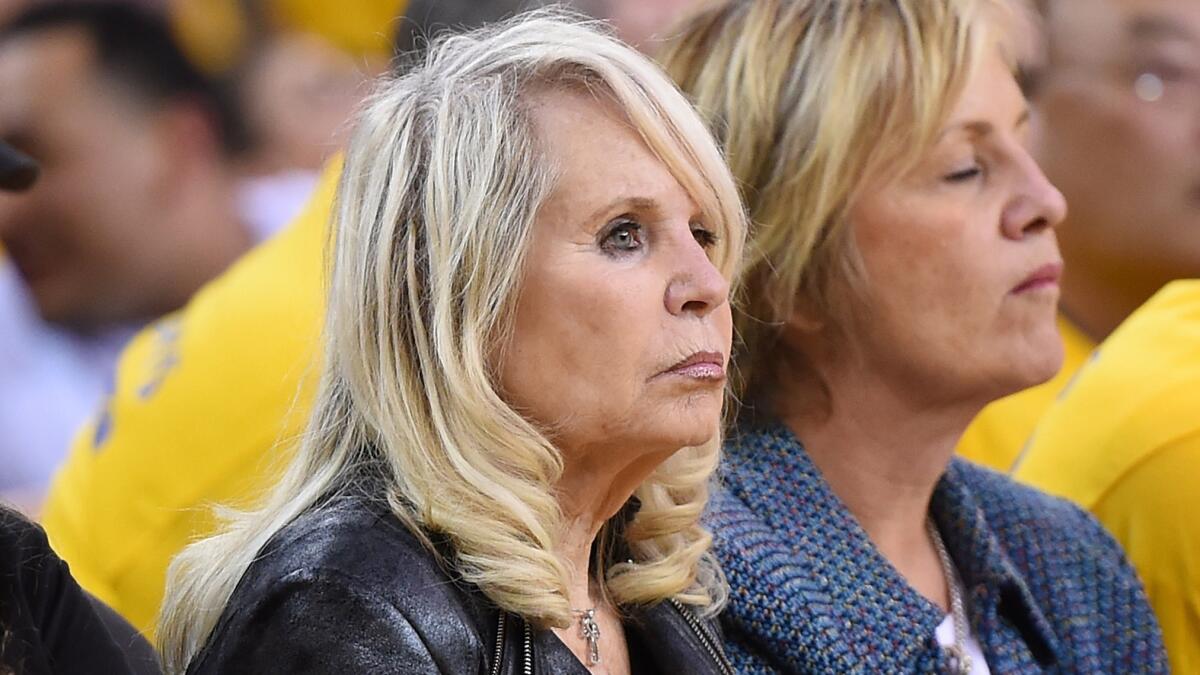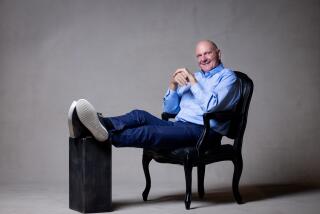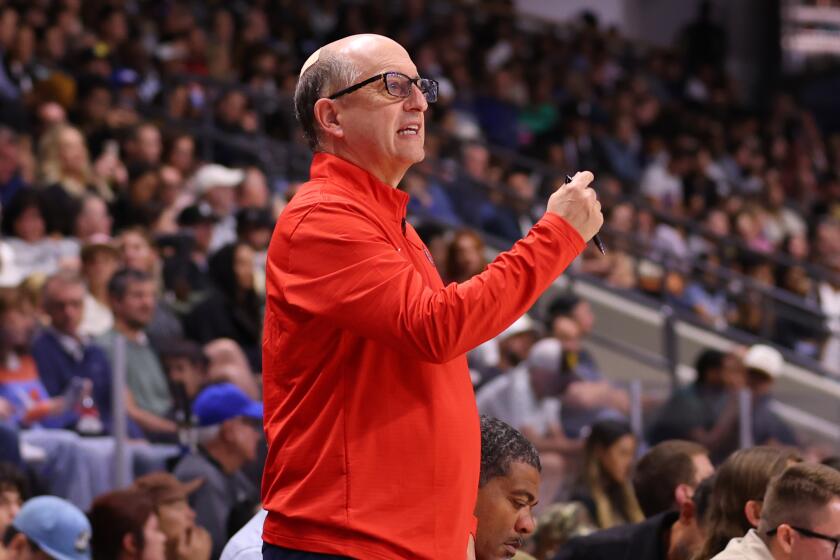Clippers sale: Trial to review Shelly Sterling’s actions

A trial into whether Shelly Sterling had the right to sell the Clippers will not focus on her husband’s mental capacity, but instead will review if she acted properly under the terms of a family trust and if Donald Sterling could legally kill the deal after it appeared set.
The sharply narrowed parameters for the July 7 trial, which both sides agreed to, mean there will not be dueling experts testifying whether Donald Sterling, 80, suffers from Alzheimer’s disease or dementia that purportedly left him unfit to run his business empire.
Instead, Sterling’s lawyers will try to prove that his wife used undue influence or fraud to get him to consult with two psychiatrists, who found him mentally incapacitated. If that argument does not succeed, the lawyers will assert that Sterling’s withdrawal from a family trust 11 days after the $2-billion sale of the Clippers means the deal cannot be completed.
“You have taken a $2-billion issue and reduced it to a one-day trial,” said Gary M. Ruttenberg, a probate attorney representing Donald Sterling.
Shelly Sterling’s lead attorney, Pierce O’Donnell, argued that the sale was good for both Sterlings and their family trust, adding: “There are 2 billion reasons this sale should go through.”
After the hearing Monday in Los Angeles Superior Court downtown, which neither Sterling attended, both sides pronounced themselves “thrilled” at the outcome. Both predicted they would prevail on July 7. Judge Michael Levanas is expected to take the case under submission after hearing evidence.
Shelly Sterling, 79, would like to have the judge’s ruling in place by July 15. NBA owners meet that day and could vote to approve the sale of the team to former Microsoft chief executive Steve Ballmer. A binding term sheet requires that a judge find Shelly can sell the team on her own, if her husband continues to balk at a sale.
Shelly signed the sales contract with Ballmer on May 29, the same day she invoked the terms of the family trust that controls the Clippers, declaring she was sole trustee because her husband had been deemed mentally incapacitated.
That was about a month after release of an audio recording in which Donald Sterling could be heard admonishing a frequent companion not to bring blacks to Clippers games. NBA Commissioner Adam Silver banned Sterling from the NBA for life, hit him with a $2.5-million fine and moved to force the sale of the team. But before the league’s Board of Governors could strip Sterling of ownership, his wife reached the record-breaking deal with Ballmer.
Donald Sterling’s lawyers said Monday that their own expert, Dr. Jeffrey Cummings, had examined the billionaire over the weekend in Las Vegas. Cummings was prepared to testify that the Clippers boss was mentally capable.
Cummings found that Sterling suffers only from “mild cognitive impairment” typical of people his age, according to attorney Ruttenberg.
“You tend to have these senior moments, where you can’t remember an address or somebody’s name,” Ruttenberg said. “Mr. Sterling admitted to that. It doesn’t mean he can’t run his empire.”
Instead of focusing on that issue, Sterling’s lawyers will now try to prove that his wife somehow misled him into seeing the medical experts. She owed greater disclosure not only as his wife, but as a fellow trustee of the family trust, who had a fiduciary responsibility to assure his interests were tended to, Donald Sterling’s lawyers said.
Shelly’s attorney, O’Donnell, said that the NBA’s most senior owner had ample reason to know that the examinations he underwent in May were to determine his mental fitness. He signed a trust renewal last December that laid out the possibility of such exams, knew the two doctors who saw him were mental health experts and voluntarily submitted to CT and PET scans at Cedars-Sinai Medical Center, O’Donnell said.
The other issue looming is whether Donald Sterling’s June 9 revocation of the family trust can quash the sale.
The Sterling Family Trust is a revocable trust — meaning either of the two principals can withdraw at any time, with the assets flowing back to them under the previous ownership terms.
Judge Levanas suggested Monday that, while little discussed previously, the revocation question had become “the sort of elephant in the room here.”
Shelly’s lawyers argued that the revocation was an 11th-hour action that could not fairly interrupt the sale she already arranged with Ballmer. They noted that Donald had agreed in a May 22 letter “to the sale of his interest in the Los Angeles Clippers.”
“What it really comes down to at the end of the day is honoring your commitments,” O’Donnell said outside court Monday. “Shelly made a commitment that he authorized her to make in the May 22 letter. He issued public statements saying, ‘Way to go Shelly, great deal!’ And then he changes his mind. You can’t do that.”
Sterling’s lawyer countered that participants in a trust that has been revoked can make only passive transactions — such as dividing assets — and not “an overt, active act to sell a $2-billion asset.” He suggested that Levanas should rule that it is beyond his authority to sign off on the sale of the team.
Levanas denied an attempt by Donald Sterling’s lawyers to get more time to prepare for the trial. He said the issues were already well known. He also denied an attempt by Sterling’s side to keep Ballmer’s lawyer out of court. Levanas said the law gave him wide latitude to allow interested parties to participate.
Both sides and even the judge acknowledged that, regardless of his eventual ruling, one outcome seemed likely — an appeal by the losing side.
More to Read
Get our high school sports newsletter
Prep Rally is devoted to the SoCal high school sports experience, bringing you scores, stories and a behind-the-scenes look at what makes prep sports so popular.
You may occasionally receive promotional content from the Los Angeles Times.








